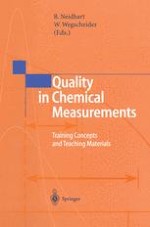2001 | OriginalPaper | Chapter
Metrology in Chemistry
Author : M. Valcárcel
Published in: Quality in Chemical Measurements
Publisher: Springer Berlin Heidelberg
Included in: Professional Book Archive
Activate our intelligent search to find suitable subject content or patents.
Select sections of text to find matching patents with Artificial Intelligence. powered by
Select sections of text to find additional relevant content using AI-assisted search. powered by
There are two main aspects of the quality of analytical information provided by analytical laboratories. On the one hand, results must be based on metrological principles and, on the other hand, they may be coherent with the requested information by “clients” (solving analytical problems). The first approach will be implemented in a practical way.Metrology is the science of the measurements. Traditionally, this term has been used to describe measurements of physical parameters, but there is no reason why it should not be used to refer to chemical measurements.Metrological principles are unique, but the practical connotations of metrology are rather different. There are many important differences between chemical (CMPs) and physical (PMPs) processes which will be emphasised through pertinent examples in order to demonstrate that immediate extrapolations are dangerous and there is a need to carefully adapt the great developments of metrology in physics to the chemical field.Because most of the written standards and guides are focussed to physical measurements, there is a need to develop documents understandable and useful for analytical chemists which give answers to questions such as “how to be traceable?”, “how to validate a method?”, etc. In this way metrology will be closer to the chemical bench level.
